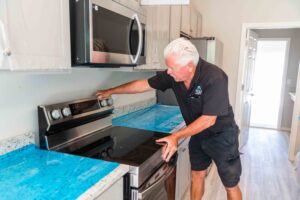Imagine this: It’s hurricane season and the storm clouds are rolling in. The wind is ramping up. Forecasters are calling for 80-mile per hour (or faster) gusts.
So, the question is, is your house safe? Will it hold up to the wind?
If you answered “yes,” do you know what’s making it safe? Who is ultimately responsible for keeping your home safe when extreme conditions arrive in Polk County?
“Safety is the biggest goal for our building inspectors,” said Polk County Building Official Ryan Wiggins. “We don’t really evacuate in Polk County, so we have to make sure that, when hurricanes hit, you can stay in your home without worrying that it will be blown away.”

How many building inspectors are there?
Wiggins manages a team of 32 inspectors, who perform 850 inspections per day. Think about that for a moment – 32 Polk County Building Division employees inspect 850 sites per day! That’s almost 27 inspections per person per day.
“Not only do our inspectors visit quite a few sites, they often drive more than 100 miles each day,” Wiggins said. “So, they have to hustle.”
What do building inspectors do?
Inspectors examine buildings to assess four elements: structural integrity, mechanical elements, electrical systems and plumbing work. They ensure that the work being done matches the building plans that were submitted to the county and state code. Depending on what’s being inspected, the walkthrough can take just 15 minutes or up to two hours.
Some inspectors review each of the four elements, and some focus on just one. They have all spent at least five years working on what they inspect, and, as they buzz through each work site, they identify any construction defects or issues that need to be addressed before the property is occupied. So, if framing is done incorrectly, or if a toilet leaks, the inspectors will issue a failing report. On new construction, this means buyers or renters cannot become occupants until the work is corrected.
 People cannot move into a new house unless building inspectors deem it 100% safe, for today and for whenever dangerous weather hits Polk County. The inspectors are, in a sense, the final line of protection for the county’s residents.
People cannot move into a new house unless building inspectors deem it 100% safe, for today and for whenever dangerous weather hits Polk County. The inspectors are, in a sense, the final line of protection for the county’s residents.
“Because of their experience, our inspectors are not just telling builders what a code book says,” said Wiggins. “They’ve done it, too. They understand how hard the builders have worked on a project, and they know exactly why something failed and how to fix it.”
Polk County inspectors also conduct inspections in occupied homes, always with a resident and/or contractor present. If inspectors find an issue, occupants can remain in the residence while corrections are made unless the issue is life threatening.
The job doesn’t stop because of bad weather
As the old U.S. Postal Service cliché goes, the inspectors are on the job rain or shine. Even in the heat of summer, they’re at construction sites, moving quickly from home to home. They are out post-hurricane, helping residents by doing damage assessments.
“As soon as the wind is below 45 miles per hour, we send out teams of two,” Wiggins said.
Polk County’s building inspectors view every residence in unincorporated Polk County after major weather events. The damage they see gets reported to the Federal Emergency Management Agency, and their work helps the county secure disaster assistance.
Building inspectors and builders
Customer service is a point of emphasis for Polk’s building inspectors. They are encouraged to communicate and build relationships with builders and homeowners. The goal is to demonstrate to contractors that the inspectors are looking out for them, as well as future residents.
“The builders obviously have deadlines to meet,” Wiggins said, “so they’re working to get as much done as they can as quickly as possible. But things also have to be done safely. There’s no substitute for life safety. We strive to make sure the builders know we have their best interests in mind. That way, no one gets upset when something gets failed. The work simply gets corrected, and we’re all able to move on with our day.”
“What would happen if the county passed an inspection that should have not been passed and then a hurricane comes? The last thing anyone wants is for someone’s  home to have a structural issue, especially if or when a hurricane comes. As a builder, contractor and building inspector, part of the reputation you want is knowing that, when homes are built in Polk County, they are built to a quality standard meeting Florida Building Code requirements. This is why we see our working relationship with the construction industry as a partnership that is good for the community,” said Wiggins.
home to have a structural issue, especially if or when a hurricane comes. As a builder, contractor and building inspector, part of the reputation you want is knowing that, when homes are built in Polk County, they are built to a quality standard meeting Florida Building Code requirements. This is why we see our working relationship with the construction industry as a partnership that is good for the community,” said Wiggins.